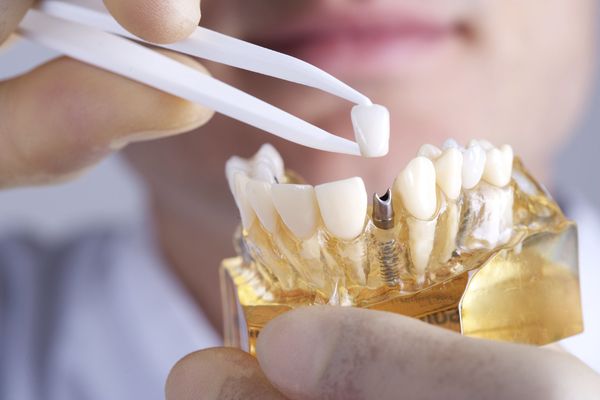Implant-Supported Crowns for Long-Lasting Strength and Functionality
Implant-supported crowns provide a stable, long-lasting, and natural-looking replacement for a missing tooth. Dr. Art Carpenter’s extensive continued education allows him to provide patients with state-of-the-art restorative care at our Kenilworth, IL, office. An implant-supported crown offers numerous benefits, especially when compared with traditional tooth replacement options. Dr. Carpenter’s expertise ensures patients receive durable and aesthetic restorations that strengthen and improve the health of their smiles.

Implant-supported crowns include the implant post, abutment, and the crown.
What is an Implant-Supported Crown?
An implant-supported crown is similar to a traditional dental crown, except, instead of fitting over an existing tooth, it fits over a dental implant. When a tooth is lost, a dental implant is the best way to replace that tooth. The implant itself replaces the missing root, while the crown attaches to the titanium post, replacing the entire structure of your missing tooth.
Is this Option Right For Me?
While dental implants are the best tooth replacement option available, they are not right for everyone. To qualify for an implant-supported crown, you must have adequate bone tissue, which will later fuse with the implant to create the permanent restoration. Bone loss naturally begins to occur after you have lost a tooth. If you have been missing the tooth for an extended period of time, a bone graft or sinus lift may be needed to rebuild the deteriorated jawbone in that area. You should also be a non-smoker and have good oral health. If you suffer from gum disease or tooth decay, our doctors must address those issues first.
What are the Benefits of Implant-Supported Restorations?
In replacing a single missing tooth, patients have two options: a traditional dental bridge or an implant-supported crown. Both options can restore your dental function and fill the gap in your smile. However, implant-supported crowns and other types of implant-supported restorations offer an array of benefits when compared with their traditional counterparts.
A traditional bridge requires the alteration of the two teeth on either side of a gap to support the restoration. Altering these teeth weakens your healthy tooth structure and cannot be reversed. Additionally, a traditional bridge only replaces the missing portion of the tooth above the gum line, not the roots that provide essential regenerative signals to maintain bone density. As a result, bone loss will continue to occur with a traditional bridge. Because implant-supported crowns rely on a dental implant that has replaced lost tooth roots, bone loss is prevented and there is no need to alter the nearby healthy teeth. Additionally, dental implants help to provide a more stable foundation, providing longevity for your restoration and confidence in your smile.
Dr. Carpenter can provide the advanced restorative solutions you need to rebuild your smile and oral health.
Treatment Process
Dental implants placement and the restoration process takes place in stages. After evaluating your teeth, gums, and bone health, Dr. Carpenter can proceed with the placement of the implant. Once the implant is in place, a healing period of three to six months is needed to give the implant time to fuse with the bone tissue.
Once this fusion, known as osseointegration, takes place, Dr. Carpenter will attach the implant abutment, which supports the crown. After another brief healing period of about two weeks, he can take impressions and create your permanent crown. Once the crown is ready, he will attach it to the abutment, leaving you with a strong and durable smile.
Schedule a Consultation Today
Dr. Carpenter can provide the advanced restorative solutions you need to rebuild your smile and oral health. If you are missing a tooth and want a long-lasting solution, contact our office online or call (847) 251-5004 to schedule a dental implant consultation.






